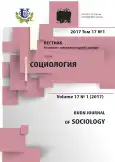European Christian Churches and their level of influence
- Authors: Mudrov SA1
-
Affiliations:
- Baranovichi State University
- Issue: Vol 17, No 1 (2017)
- Pages: 63-72
- Section: Contemporary society: the urgent issues and prospects for development
- URL: https://journal-vniispk.ru/2313-2272/article/view/340486
- DOI: https://doi.org/10.22363/2313-2272-2017-17-1-63-72
- ID: 340486
Cite item
Full Text
Abstract
The article evaluates the level of influence of the Christian Churches in the European Union. In order to identify this influence, the author considers such variables as the degree of the religiosity of the state and the presence of Churches at the supranational (EU) level. Using the parameters of religiosity - belief in God, belonging to a particular denomination, and the confidence in the Church - the author identifies areas of high, medium and low influence of the Churches in the EU. The area of high influence includes Cyprus, Greece, Malta, Romania, Italy, Croatia and Poland; the medium influence area includes Germany, Spain, Finland, Ireland, Slovenia, Portugal, Denmark, Sweden, Luxembourg, Slovakia, Bulgaria, Hungary, Lithuania and Austria; and the low influence area - Estonia, the Czech Republic, France, the UK, Belgium, Latvia and the Netherlands. Only countries with the homogenous Catholic or Orthodox population are inside the area of the high influence, while the countries with multi-confessional population are mainly in the area of low influence. This is partly due to the historical circumstances, but also to the rivalry between denominations, their ability to work together, and peculiarities of social doctrines. The author believes that all Christian denominations, with the exception of some Free Churches, show readiness to cooperate with the EU institutions on a variety of issues, which is confirmed by the growing number of religious representations in Brussels, where the Catholic Church has managed to establish the most influential and professional bodies, followed by the Orthodox and then by the mainstream Protestants. However, European institutions do not show the same degree of openness and eagerness to interact with the Christian Churches as the latter express about interacting with the EU.
About the authors
S A Mudrov
Baranovichi State University
Author for correspondence.
Email: mudrov@tut.by
Parkovaya St., 62, Baranovichi, 225404, Belarus
References
- COMECE and CSC CEC, 2010. Article 17 of the Treaty on the Functioning of the European Union. General considerations on the implementation of the dialogue: Paragraph 3. Available from: http://csc.ceceurope.org/fileadmin/filer/csc/European_Integration/20100427_COMECE-CSC_Proposal_on_Article_17_TFEU.pdf.
- European Commission, 2017. Dialogue with Churches, Religious Associations or Communities and Philosophical and Non-Confessional Organizations. Available from: http://ec.europa.eu/ newsroom/just/item-detail.cfm?item_id=50189.
- European Commission: Guidelines on the implementation of the Article 17 TFEU. Available from: http://www.eurel.info/IMG/pdf/guidelines-implementation-art-17.pdf.
- European Values Study: Integrated Dataset, 2008. Variable v205: How much confidence in: Church. Available from: http://zacat.gesis.org/webview/index.jsp?object=http://zacat.gesis.org/ obj/fCatalog/Catalog5.
- Haynes J. (Ed.) Religion and Politics in Europe, the Middle East and North Africa. Routledge, 2010.
- Knippenberg H. The political geography of religion: Historical state-church relations in Europe and recent challenges. GeoJournal. 2006;67.
- Leustean L. What is the European Union? Religion between neofunctionalism and intergovernmentalism. International Journal for the Study of the Christian Church. 2009;9(3).
- Leustean L. Representing religion in the European Union. A typology of actors. Politics, Religion and Ideology. 2011;12(3).
- Madeley J. A framework for the comparative analysis of church-state relations in Europe. West European Politics. 2003;26(1).
- McCrea R. Religion and the Public Order of the European Union. Oxford Scholarship Online, 2011.
- Riedel S. Models of church-state relations in European democracies. Journal of Religion in Europe. 2008;1(3).
- Special Eurobarometer 341, 2010. Biotechnology. Available from: http://ec.europa.eu/public_ opinion/archives/ebs/ebs_341_en.pdf.
- Special Eurobarometer 393, 2012. Discrimination in the EU. Available from: http://ec.europa.eu/ public_opinion/archives/ebs/ebs_393_en.pdf.
- Statistics Estonia, 2013: Over a quarter of the population are affiliated with a particular religion. Available from: http://www.stat.ee/65352.
- Transparency Register. Available from: http://ec.europa.eu/transparencyregister/public/ homePage.do?redir=false&locale=en.
Supplementary files









